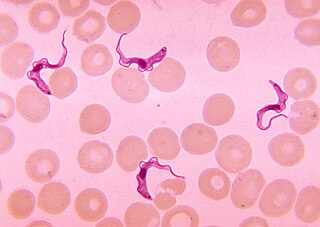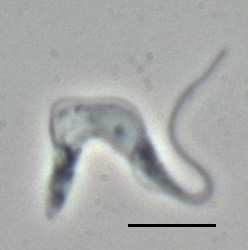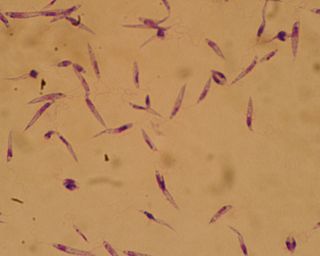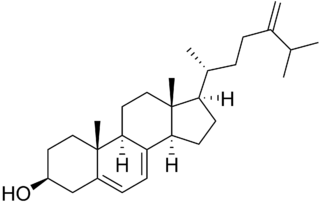
Tsetse, sometimes spelled tzetze and also known as tik-tik flies, are large biting flies that inhabit much of tropical Africa. Tsetse flies include all the species in the genus Glossina, which are placed in their own family, Glossinidae. The tsetse are obligate parasites that live by feeding on the blood of vertebrate animals. Tsetse have been extensively studied because of their role in transmitting disease. They have a prominent economic impact in sub-Saharan Africa as the biological vectors of trypanosomes, which cause human sleeping sickness and animal trypanosomiasis. Tsetse are multivoltine and long-lived, typically producing about four broods per year, and up to 31 broods over their lifespans.

Oliver Rolf Kahn is a German former football goalkeeper. He started his career in the Karlsruher SC Junior team in 1975. Twelve years later, Kahn made his debut match in the professional squad. In 1994, he was transferred to Bayern Munich for the fee of DM4.6 million, where he played until the end of his career in 2008. His commanding presence in goal and aggressive style earned him nicknames such as Der Titan from the press and Vol-kahn-o ("volcano") from fans.

Robert Elliot Kahn is an American electrical engineer, who, along with Vint Cerf, first proposed the Transmission Control Protocol (TCP) and the Internet Protocol (IP), the fundamental communication protocols at the heart of the Internet.

Gustav Gerson Kahn was an American lyricist.

Trypanosoma is a genus of kinetoplastids, a monophyletic group of unicellular parasitic flagellate protozoa. Trypanosoma is part of the phylum Sarcomastigophora. The name is derived from the Greek trypano- (borer) and soma (body) because of their corkscrew-like motion. Most trypanosomes are heteroxenous and most are transmitted via a vector. The majority of species are transmitted by blood-feeding invertebrates, but there are different mechanisms among the varying species. Some, such as Trypanosoma equiperdum, are spread by direct contact. In an invertebrate host they are generally found in the intestine, but normally occupy the bloodstream or an intracellular environment in the mammalian host.

Joseph Jun-hee Kahn is a Korean-American film and music video director. Kahn has worked with various artists such as Taylor Swift, Eminem, Britney Spears, Backstreet Boys, Jennifer Lopez, Lady Gaga, Kylie Minogue, Samantha Mumba, Shakira, Aaliyah, Dr. Dre, Snoop Dogg, Kelly Clarkson, Ava Max, Mariah Carey, Imagine Dragons, Christina Aguilera, 50 Cent, Destiny's Child, George Michael and Jonas Brothers.

Dominique Gaston André Strauss-Kahn is a French economist, politician, former managing director of the International Monetary Fund (IMF), and a controversial figure in the French Socialist Party due to his involvement in several financial and sexual scandals. He is often referred to in the media, and by himself, by his initials DSK. Strauss-Kahn was appointed managing director of the IMF on 28 September 2007, with the backing of then–President of France Nicolas Sarkozy. He served in that capacity until his resignation on 18 May 2011, in the wake of allegations that he had sexually assaulted a hotel maid. Other serious allegations followed.

Phillips Exeter Academy Library is a library that serves Phillips Exeter Academy, an independent boarding school located in Exeter, New Hampshire. It is the largest secondary school library in the world, containing 160,000 volumes over nine levels with a shelf capacity of 250,000 volumes.

Trypanosoma brucei is a species of parasitic kinetoplastid belonging to the genus Trypanosoma. This parasite is the cause of vector-borne diseases of vertebrate animals, including humans, carried by species of tsetse fly in sub-Saharan Africa. In humans T. brucei causes African trypanosomiasis, or sleeping sickness. In animals it causes animal trypanosomiasis, also called nagana in cattle and horses. T. brucei has traditionally been grouped into three subspecies: T. b. brucei, T. b. gambiense and T. b. rhodesiense. The first is a parasite of non-human vertebrates, while the latter two are known to be parasites of humans. Only rarely can the T. b. brucei infect a human.

Trypanosoma cruzi is a species of parasitic euglenoids. Amongst the protozoa, the trypanosomes characteristically bore tissue in another organism and feed on blood (primarily) and also lymph. This behaviour causes disease or the likelihood of disease that varies with the organism: Chagas disease in humans, dourine and surra in horses, and a brucellosis-like disease in cattle. Parasites need a host body and the haematophagous insect triatomine is the major vector in accord with a mechanism of infection. The triatomine likes the nests of vertebrate animals for shelter, where it bites and sucks blood for food. Individual triatomines infected with protozoa from other contact with animals transmit trypanosomes when the triatomine deposits its faeces on the host's skin surface and then bites. Penetration of the infected faeces is further facilitated by the scratching of the bite area by the human or animal host.

Leishmania major is a species of parasites found in the genus Leishmania, and is associated with the disease zoonotic cutaneous leishmaniasis. L. major is an intracellular pathogen which infects the macrophages and dendritic cells of the immune system. Though Leishmania species are found on every continent aside from Antarctica, Leishmania major is found only in the Eastern Hemisphere, specifically in Northern Africa, the Middle East, Northwestern China, and Northwestern India.

Leishmania donovani is a species of intracellular parasites belonging to the genus Leishmania, a group of haemoflagellate kinetoplastids that cause the disease leishmaniasis. It is a human blood parasite responsible for visceral leishmaniasis or kala-azar, the most severe form of leishmaniasis. It infects the mononuclear phagocyte system including spleen, liver and bone marrow. Infection is transmitted by species of sandfly belonging to the genus Phlebotomus in Old World and Lutzomyia in New World. Therefore, the parasite is prevalent throughout tropical and temperate regions including Africa, China, India, Nepal, southern Europe, Russia and South America. It is responsible for thousands of deaths every year and has spread to 88 countries, with 350 million people at constant risk of infection and 0.5 million new cases in a year.

5-Dehydroepisterol is a sterol and an intermediate in steroid biosynthesis, particularly synthesis of brassinosteroids. It is formed from episterol through action of ERG3, the C-5 sterol desaturase in the yeast and is then converted into 24-methylenecholesterol by 7-dehydrocholesterol reductase.

Non-coding RNAs (ncRNA) are RNA molecules that have a function but are not translated into proteins. Small nucleolar RNAs (snoRNAs), one of the largest classes of ncRNA, are further subdivided into the two major C/D and H/ACA snoRNA families. snoRNA serve as guide RNAs for 2'-O-methylation and pseudouridylation of specific nucleotides and indicate the site of modification by direct base pairing with the target RNA. The majority of these snoRNAs are responsible for the post-transcriptional modification of ribosomal RNAs (rRNA) and in some cases of small nuclear RNAs (sRNAs). These post-transcriptional modifications are crucial for rRNA processing, stability and maturation.

Bodonida is an order of kinetoplastid flagellate excavates. It contains the genera Bodo and Rhynchomonas, relatives to the parasitic trypanosomes. This order also contains the colonial genus Cephalothamnium.

Trypanosoma antiquus is an extinct species of kinetoplastid, a monophyletic group of unicellular parasitic flagellate protozoa.
The tyranny of small decisions is a phenomenon explored in an essay of the same name, published in 1966 by the American economist Alfred E. Kahn. The article describes a situation in which a number of decisions, individually small and insignificant in size and time perspective, cumulatively result in a larger and significant outcome which is neither optimal nor desired. It is a situation where a series of small, individually rational decisions can negatively change the context of subsequent choices, even to the point where desired alternatives are irreversibly destroyed. Kahn described the problem as a common issue in market economics which can lead to market failure. The concept has since been extended to areas other than economic ones, such as environmental degradation, political elections and health outcomes.

Paleoleishmania is an extinct genus of kinetoplastids, a monophyletic group of unicellular parasitic flagellate protozoa. At present it is placed in the family Trypanosomatidae. The genus contains two species, Paleoleishmania neotropicum and the type species Paleoleishmania proterus.

Tom David Kahn was an American social democrat known for his leadership in several organizations. He was an activist and influential strategist in the Civil Rights Movement. He was a senior adviser and leader in the U.S. labor movement.
Piet Borst is emeritus professor of Clinical Biochemistry and Molecular Biology at the University of Amsterdam (UVA), and until 1999 Director of Research and Chairman of the Board of Directors of the Netherlands Cancer Institute and the Antoni van Leeuwenhoekziekenhuis (NKI-AVL). He continued to work at the NKI-AVL as a staff member and group leader until 2016.


















